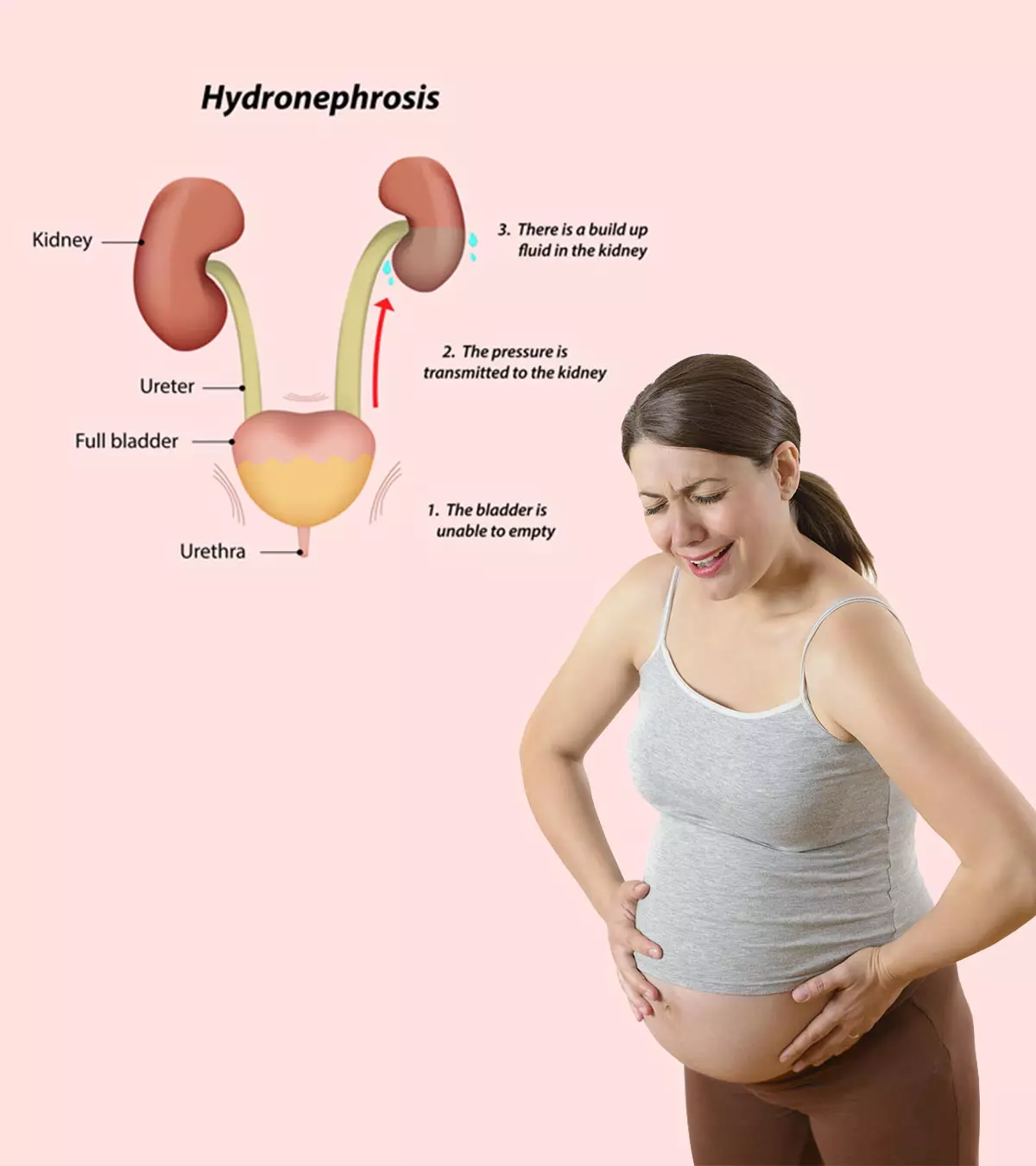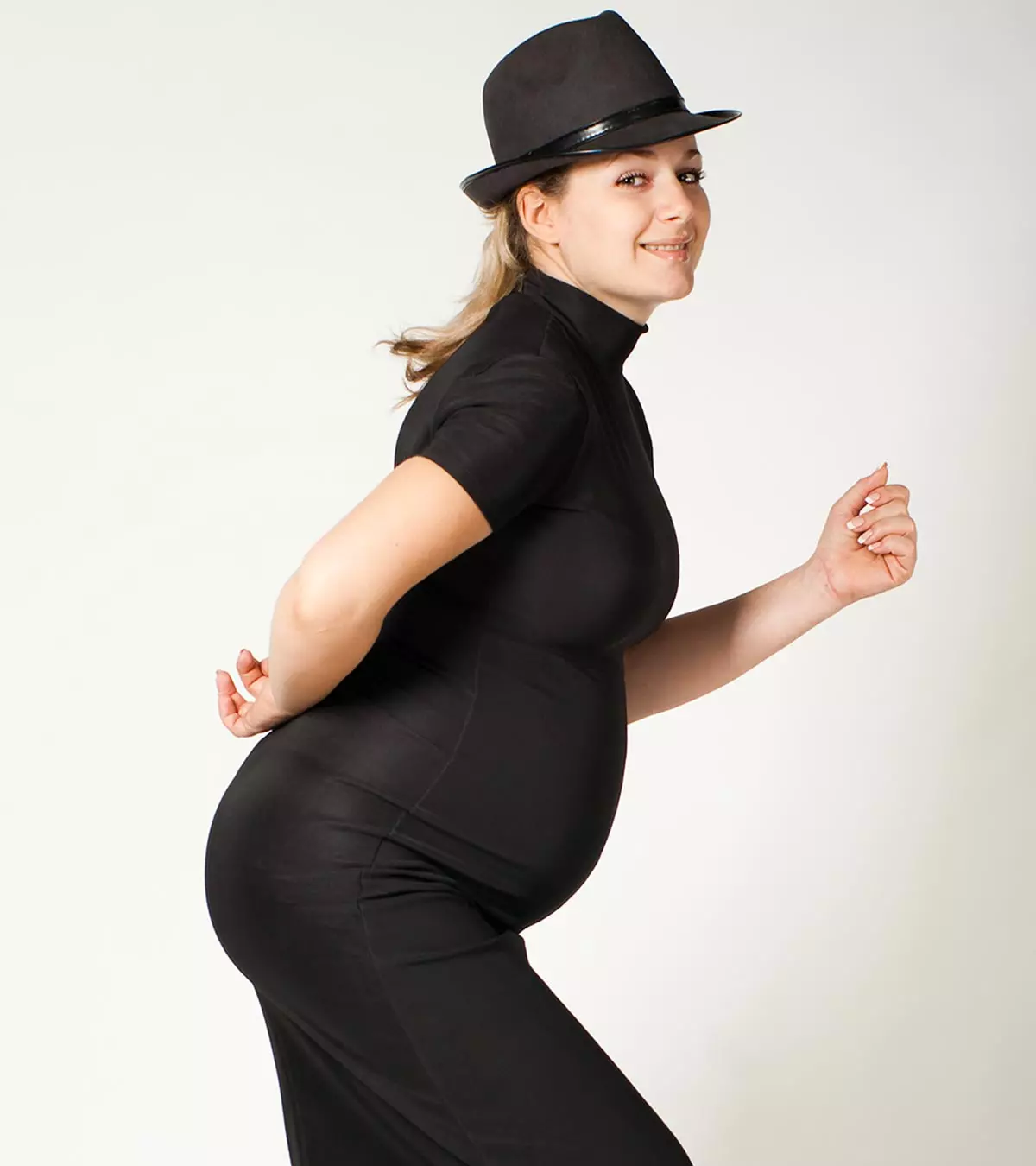
Image: ShutterStock
Every year, about 20% of pregnant women are recommended ‘activity restriction’ or bed rest during pregnancy by the doctors (1). The exercise may involve a normal rest or complete inactivity under hospital supervision based on the progress of the pregnancy. The main aim of bed rest is to prevent any unfortunate event. While it aims to prevent complications and may be necessary for some women, it also comes with challenges. Read this post to learn more about bed rest during pregnancy, including its benefits, side effects, and ways to cope with movement restriction.

Key Pointers
- Bed rest involves limiting physical activities and can range from regular rest to complete inactivity under hospital supervision.
- Pregnant women at risk of developing complications may be advised to undergo bed rest to lower blood pressure and improve blood flow to the placenta.
- To make bed rest comfortable, women are advised to sleep sideways on the left with a pillow between their knees and hips or knees bent.
- Bed rest during pregnancy can have negative physical consequences such as bone loss, weight changes, and cardiovascular problems, and may increase the risk of depression.
What Does ‘Bed Rest’ Mean?

Bed rest refers to limiting your activities to just a few basic ones, for a specific period. Sometimes all that you are allowed to do is move around the house a little to use a shower or toilet. You should avoid lifting heavy objects or doing extremely difficult or tiring household chores.
Sometimes (particularly in high-risk pregnancies), when complete bed rest is necessary, the doctor may advise hospitalization (2).
Moreover, in some cases, being on bed rest will improve blood flow to the placentaiA temporary organ formed in pregnancy that clings to the uterus and supplies nutrients and oxygen to the developing fetus , save a lot of energy and prevent pregnancy complications.
 Point to consider
Point to considerWhen Will A Doctor Put You On Bed Rest During Pregnancy?
Multiple pregnancy issues can lead to bed rest. Your doctor will put you on bed rest and also discuss the measures you need to take to stay healthy in the following scenarios (3).
- Placenta previa: This is when the placenta is situated lower than its actual position, blocking the cervix and there is risk of bleeding during pregnancy. Bed rest, in this case, will avoid any additional pressure on the placenta and cervix (4).
- Preeclampsia: This condition usually develops after the 20th week of pregnancy, due to elevated blood pressure, protein in the urine, and edemaiSwelling caused by fluid in the body’s tissues . Severe cases could put both you and your baby at risk and may warrant complete bed rest in the hospital for constant monitoring (5).
 Point to consider
Point to consider- Cervical insufficiency: Prior cervical damages, cervical lacerations or congenital abnormalities in the uterus may cause the fetus to slip off the womb. When the expectant mother is suffering from cervical incompetenceiA condition where the cervix opens too early during pregnancy, potentially causing complications or insufficiency, bed rest is highly recommended to avoid any pressure on the cervix in a standing position (6).
- Pregnancy bleeding: Sometimes, there may be slight bleeding or spotting generally in early pregnancy due to conditions such as placental abruptioniDetachment of the placenta from the uterus before childbirth , cervical rupture or uterine tear. Your doctor may advise bed rest until the spotting stops. Sometimes, bleeding or spotting in second and third trimesters may lead to bed rest throughout the pregnancy (4).
According to a study supported by the Eunice Kennedy Shriver National Institute of Child Health and Human Development, 17.8% of 2307 women reported bleeding during the first trimester. This was directly associated with a drop in fetal weight depending on the intensity of the bleeding. The study showed that women who bled more than a day delivered a baby that weighed less by 68 to 107 grams than those who did not bleed or bled for less than a day.
- Overactive lifestyle: If you lead a very active lifestyle and do not pay attention to your health and nutrition, you will be ordered to bed rest. Having a balanced diet and staying relaxed will promote healthy fetal development, reduce the risk of maternal-fetal complications such as fetal distressiA condition when a baby lacks enough oxygen before or during birth and minimize the need for bed rest.

- Oligohydramnios: It is the presence of low amniotic fluidi A transparent, light yellow fluid that protects the fetus from harm , which puts you and your baby at risks. Therefore, bed rest at home or hospital is required for continuous monitoring of the mother and the fetus (7).
- Multiple pregnancies: Although bed rest is not routinely advised if you are carrying twins, it is essential in the case of multiple pregnancies like triplets or quadruplets, when you are highly prone to complications (8).
- Preterm labor: Pregnant women showing signs of early labor before 37 weeks may be advised to take bed rest. While full bed rest lacks proven effectiveness, partial rest with expectant management may help delay labor until full term (9).
 Point to consider
Point to considerA blogger and a mother, Dawn Perry, who began bleeding at 35 weeks pregnant, shares that she was also put on bed rest for two weeks and its cause. She recalls, “After a 48-hour investigation, we had a diagnosis. I’d had a partial placental abruption, and a seven-centimeter blood clot had formed where the placenta detached from my uterus. No one really knows what causes this. I’d been holding out hope they’d send me home. The contractions had slowed, and the bleeding abated. But if the clot didn’t hold, I could hemorrhage. I wasn’t going home. The plan was “bed rest with bathroom privileges” (meaning I could pee all by myself!) for two more weeks. At that point, I’d be 37 weeks pregnant, the baby’s lungs would be fully developed, and they’d induce labor (i).”
Even if you are not experiencing any of the above symptoms, your doctor may suggest bed rest if he or she thinks you’ll benefit from it. Read on to know more about it.
Are There Different Types Of Bed Rest?
Yes, not all pregnant women need to rest all the time. Different doctors prescribe different types of bed rest depending on your condition and requirement (10) (13).
- Scheduled resting: This is usually suggested for mothers in their third trimester, older mothers or those carrying multiples. You will be asked to rest for some time every day, to limit your work day or to avoid exerting activities such as walking, stair climbing or standing for extended periods.
- Modified or partial bed rest: This refers to spending part of the day in bed or lying down or resting. The amount of rest your doctor suggests may vary from a couple of hours to an extended portion of the day. You are prohibited from driving, working, handling household chores, exercising, or lifting weights. You are allowed to work on a desk at home, but for a short period.
- Strict or complete bed rest: This is precisely what it says. You should be in bed all day long and may have restrictions on showering and toilet usage. While in some cases you can sit and eat, other cases you can only stay reclined all the time.
- Hospital bed rest: It is the strictest form of bed rest that will not let you get up at all during the day. You have to use a bedpan, and it includes special positioning on the hospital bed. Ideally, your head will be positioned lower compared to your body to relieve pressure on the cervical region.
You may require scheduled and modified bed rest only for a few weeks to alleviate pregnancy-related complications such as fluid retention, high blood pressure (or gestational hypertension) and more. But strict hospital bed rest is usually recommended to prevent preterm laboriOnset of labor before 37 weeks of pregnancy .
How Does Bed Rest Help Pregnancy?
Your doctor will advise bed rest for any of the reasons listed above if you can benefit from it or to make your delivery safe.
- Bed rest improves blood circulation in the uterus and provides oxygen and nourishment to the fetus (11).
- Your cervix, placenta, and uterus will be free of additional pressure.
- It improves blood flow throughout the body and therefore prevents edema.
Questions To Ask When Your Doctor Advises Bed Rest
If your doctor recommends bed rest during pregnancy, try to ask as many questions as you need to clear all your doubts.
- How long do I need bed rest?
- Is it okay to take a shower or use the bathroom?
- What options do I have for disability insurance if I am required to take bed rest during my pregnancy?
- Is it alright to use stairs?
- Is it okay to drive or travel?
- Is it fine to do household chores and take care of my children?
- Should I avoid lifting objects?
- Do I have to remain in bed all day? Or can I go to work?
- What should be my lying position?
- Is it okay to make love?
- Is it okay to perform specific exercises?
- What are my other limitations?
Regardless of why you need bed rest and how long you need it for, it is important that you stay in the right posture or position when you rest to ensure optimal prenatal care.
What Is The Best Position For Bed Rest During Pregnancy?

When it comes to sleeping positions during pregnancy, the best approach depends on your stage of pregnancy, medical history, and any complications you may be experiencing. In most cases, you will be advised to sleep sideways towards your left, with your hips or knees bent, and a pillow placed between your knees (12).
Can You Exercise During Bed Rest?

Yes, it is good to exercise while still on bed rest, and most doctors agree on it. You can try small moves that help improve the blood circulation and keep your body from being inactive completely.
Some of the common exercises you can do include:
- Stretching: Prop a few pillows against your head and try doing gentle head circles, ankle circles, and shoulder rolls. They warm up the muscles and loosen the joints.
- Isometric exercises: They are helpful for blood circulation. Gently tighten and relax muscles of biceps, triceps, back, chest, shoulder, abdomen, legs, and buttocks. Aim for slow breathing through each repetition.
- Ankle circles: They improve blood circulation in the legs and feet. Rotate your ankles clockwise and anti-clockwise, 10 to 15 times each, and repeat (13).
It is better to perform these exercises with the help of a physical therapist. They can also give you better movement and posture tips that could help during labor.
Are There Any Side Effects Of Bed Rest During Pregnancy?

Being off your feet for a long time will undoubtedly have its risks. They may include:
- Reduced bone mass
- Weight gain or weight loss
- Cardiovascular and musculoskeletal problems
- Increased risk of depression, stress, and anxiety
- Pressure on the family as your responsibility needs to be taken care of by someone else
- Blood clots in veins of legs, a condition called deep vein thrombosis
- Concerns about finances as most companies will not pay for your extended pregnancy leave
You may or may not experience these downsides at all times. Speak to your doctor if you feel they are hard to manage.
 Research finds
Research findsHow To Cope With Movement Restrictions During Bed Rest?
Though bed rest may sound consoling, it is challenging for most women to stay put in one place for long periods. The American Pregnancy Association (APA) suggests staying engaged through activities like blogging, journaling, socializing, and preparing for the baby’s arrival while avoiding excessive internet searches to prevent misinformation (20). Here are some tips to make this phase easy and staying healthy:
- Know the rules: Have a discussion with your doctor initially and understand all the restrictions. This will lower your anxiety.
- Structure your day: Scheduling everyday activities will help fight boredom. Plan a routine, even if it is when to take a shower or a short walk. Make a to-do list of activities such as reading a book, watching a movie or solving puzzles or so.
- Exercise what your doctor recommends: You may be allowed to do certain low-impact exercises such as walking, moving your legs, resistance bands for the lower body and lightweights for the upper body. They will give you enough strength for delivery and postpartum recovery.
- Maintain a support system: Stay connected with your family and friends through phone, e-mail or social media. You might also stay in touch with other moms-to-be through online and local communities.
- Monitor your diet: Have a healthy pregnancy diet with lots of fiber and fluids. Have several small meals rather than three large ones.
- Learn new things: Teach yourself a new language, how to knit, crochet, quilt or scrapbook or take a correspondence class or watch videos on YouTube.
- Start a journal: This would be an excellent time to write down your thoughts or a few lines to your baby about the best pregnancy moments.
- Prepare for childbirth: Plan your baby’s arrival, finalize announcement ideas, select baby names, and shop for clothing, nursery essentials, and other baby-related items.
- Seek support when needed: Don’t hesitate to ask family for help with household chores, meal preparation, and errands. You can create greeting cards to express gratitude to family and friends who support you during this time.
- Practice mindfulness and deep breathing: Set aside time to reflect on your thoughts and engage in deep breathing exercises to stay calm and composed.
Preparing for the rest period by keeping things you need handy can make it less stressful.
 Quick tip
Quick tipBed Rest Check List
Make a checklist of items that you will need during the day and keep them near the bed. It will help prevent chaos and clutter (20).
- Enough water and snacks, including fruits and nuts
- Stationary such as books, pens or pencils
- Grooming material such as a mirror, brushes, comb, nail cutters
- Mobile charger, address book or directory
- Laptop or computer
- Magazines, books, newspapers or any reading materials
- TV and AC remote controls
- Waste bins
Frequently Asked Questions
1. Will bed rest in early pregnancy prevent miscarriage?
There is insufficient evidence stating that bed rest in pregnancy might prevent miscarriageiAn unexpected loss of a woman’s pregnancy before 20 weeks of gestation . A study published in the National Library of Medicine states that bed rest may not play a role in preventing a miscarriage. It could be because spontaneous miscarriage during pregnancy could be attributed to many factors, not just physical activity (15).
2. Is sitting okay during bed rest in pregnancy?
If you were asked to follow complete bed rest during pregnancy, you might still be allowed to perform minor tasks. Sitting for one hour in a chair is allowed (16).
3. Can bed rest help prevent preterm labor and delivery?
Although bed rest is advised during pregnancy to alleviate certain complications, there are not enough conclusive studies to prove that bed rest might help prevent preterm labor or delivery (16).
4. What are bed rest’s potential physical and emotional effects during pregnancy?
The potential physical and emotional effects of bed rest during pregnancy include fatigue, uneasiness, soreness of back muscles, dry skin, mood changes, stress, anxiety, financial worries, depression, and alterations of the circadian rhythm of the body, among others (17).
5. Is bed rest necessary for all women with pregnancy complications?
No. Not all, but bed rest may be needed for a few pregnancy complications to help reduce the risks of adverse outcomes. Your doctor will evaluate your condition’s severity, overall health, and the nature of your work before advising you to opt for bed rest during pregnancy.
6. Can alternative treatments or interventions be used instead of bed rest during pregnancy?
There may be other treatment modalities available based on the underlying condition. You can discuss and evaluate all possible options with your doctor and devise a beneficial plan for you and your baby.
7. What are the most challenging aspects of being on bed rest during pregnancy for women and their partners?
Being on bed rest during pregnancy might entail certain challenges, such as loss of bone and muscle strength, increased risk of blood clots, and depression. Pregnant women’s partners may be overburdened with household, financial, and childcare responsibilities (18).
8. Can I get disability insurance for bed rest during pregnancy?
You may get temporary disability insurance (TDI), offering some income security by partially replacing your wages (14). For this, talk with your HR representative and your doctor to understand the application procedure.
9. Will there be any negative impacts of bed rest on my fetus?
While large-scale studies on the effects of bed rest on fetal development are limited, some research suggests that prolonged bed rest may impact a baby’s growth. Therefore, it’s vital to consider the potential risks and follow medical guidelines carefully when prescribed bed rest during pregnancy (21) (22).
10. Is bed rest essential during the last weeks of pregnancy?
According to experts, routine bed rest is not recommended in the final weeks of pregnancy as it may increase the risk of complications like blood clots. If your doctor advises bed rest, ask if you can do light activity to stay healthy while addressing your specific medical needs (23).
In some cases, your doctor may advise you to limit even minimal activities and focus on having complete bed rest in pregnancy. It is advisable when you are experiencing any of these various conditions, including bleeding, placenta previa, high blood pressure, and early or premature labor. It is important to understand that bed rest is suggested for the safety of expectant mothers and babies. Hence you should follow your doctor’s instructions to have a healthy pregnancy and baby. Furthermore, avoid any strenuous physical activity shortly after delivery to allow your body to heal and avoid the risk of complications.
Infographic: How To Cope With Movement Restrictions During Bed Rest?
Doing nothing during pregnancy and resting can be the most relaxing experience. But if it is for an extended period, the movement restriction may get difficult to handle. So if your doctor has recommended bed rest, here are a few things you can do to cope with staying idle and prevent the side effects.
Some thing wrong with infographic shortcode. please verify shortcode syntax
Illustration: Why Do You Need Bed Rest During Pregnancy? 8 Reasons

Image: Stable Diffusion/MomJunction Design Team
During your pregnancy bed rest may be advised. Watch this informative video as we explore the truth behind bed rest during pregnancy.
Personal Experience: Source
MomJunction articles include first-hand experiences to provide you with better insights through real-life narratives. Here are the sources of personal accounts referenced in this article.
i. I survived two weeks on bedrest;https://medium.com/@dawnkperry/i-survived-two-weeks-on-bedrest-69c82f5bbb6e
References
- R L Goldenberg et. al.; (1994); Bed rest in pregnancy.
https://pubmed.ncbi.nlm.nih.gov/8008308/ - Bed Rest and Its Continued Use in Women with High-Risk Pregnancy: A Review of Literature.
https://scholar.dominican.edu/cgi/viewcontent.cgi?referer=https://www.google.co.in/&httpsredir=1&article=1043&context=senior-theses - Bed rest during pregnancy.
https://medlineplus.gov/ency/patientinstructions/000581.htm - Bleeding in Pregnancy/Placenta Previa/Placental Abruption.
https://www.chop.edu/conditions-diseases/bleeding-pregnancyplacenta-previaplacental-abruption - Preeclampsia.
https://medlineplus.gov/ency/article/000898.htm - CERVICAL INSUFFICIENCY AND SHORT CERVIX.
https://www.marchofdimes.org/find-support - Oligohydramnios.
https://myhealth.ucsd.edu/library/HealthSheets/3S40494 - Care and Management of Multiple Pregnancy.
https://www.chop.edu/conditions-diseases/care-and-management-multiple-pregnancy - Bed Rest for Preterm Labor.
https://www.columbiadoctors.org/health-library/article/bed-rest-preterm-labor/ - Bed Rest in Pregnancy: Why and How to Cope.
https://www.texashealth.org/baby-care/Pregnancy/bed-rest-in-pregnancy-why-and-how-to-cope - Despite side effects bed rest still common for high-risk pregnancy.
https://news.wisc.edu/despite-side-effects-bed-rest-still-common-for-high-risk-pregnancy/ - Sleeping Positions During Pregnancy.
https://www.urmc.rochester.edu/encyclopedia/content?contenttypeid=85&contentid=P01238 - Bed Rest During Pregnancy.
https://www.eehealth.org/~/media/files/edward-elmhurst/services/pregnancy-baby/bedrestduringpregnancy-edwardhospital.pdf?la=en - Temporary Disability Insurance.
https://www.nj.gov/labor/forms_pdfs/tdi/PR-138%20(2-18).pdf - Alicia Aleman et al; Bed Rest During Pregnancy For Preventing Miscarriage;
https://www.ncbi.nlm.nih.gov/pmc/articles/PMC8721648/ - Pregnancy Bed Rest;
https://my.clevelandclinic.org/health/articles/9757-pregnancy-bed-rest - Ms. Zahra Alnasser et al.; (2025); Inactivity during Pregnancy (Physical and Psychosocial Effects of Inactivity/Bed Rest during Pregnancy).
https://www.google.com/url?q=https://www.easpublisher.com/get-articles/2112&sa=D&source=docs&ust=1684988972981480&usg=AOvVaw3gNjrF1KfqoYiJJnUZr4lg - Bed rest during pregnancy: Is it really necessary?
https://utswmed.org/medblog/bed-rest-during-pregnancy/ - Physical Activity and Exercise During Pregnancy and the Postpartum Period
https://www.acog.org/clinical/clinical-guidance/committee-opinion/articles/2025/04/physical-activity-and-exercise-during-pregnancy-and-the-postpartum-period - Bed Rest During Pregnancy.
https://americanpregnancy.org/healthy-pregnancy/pregnancy-complications/bed-rest-during-pregnant/ - Carlo Valerio Bellieni et al. (2003); Long-Term Effects of Antepartum Bed Rest on Offspring.
https://karger.com/neo/article-abstract/84/2/147/369209/Long-Term-Effects-of-Antepartum-Bed-Rest-on - Christine Piette Durrance and Melanie Guldi; Maternal Bed Rest and Infant Health.
https://www.journals.uchicago.edu/doi/10.1162/AJHE_a_00021 - Will I need bed rest near the end of pregnancy?.
https://www.acog.org/womens-health/experts-and-stories/ask-acog/will-i-need-bed-rest-near-the-end-of-pregnancy
Community Experiences
Join the conversation and become a part of our nurturing community! Share your stories, experiences, and insights to connect with fellow parents.
Read full bio of Dr. Richa Hatila Singh
Read full bio of Rebecca Malachi
Read full bio of Swati Patwal
Read full bio of Dr. Joyani Das
















